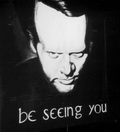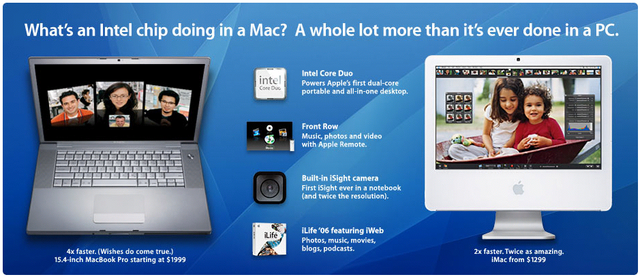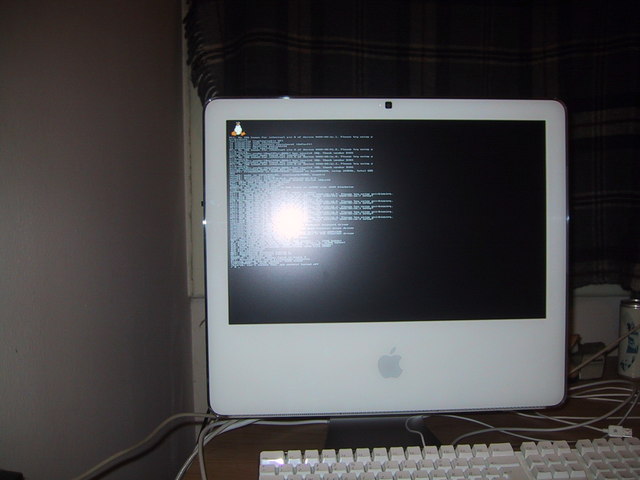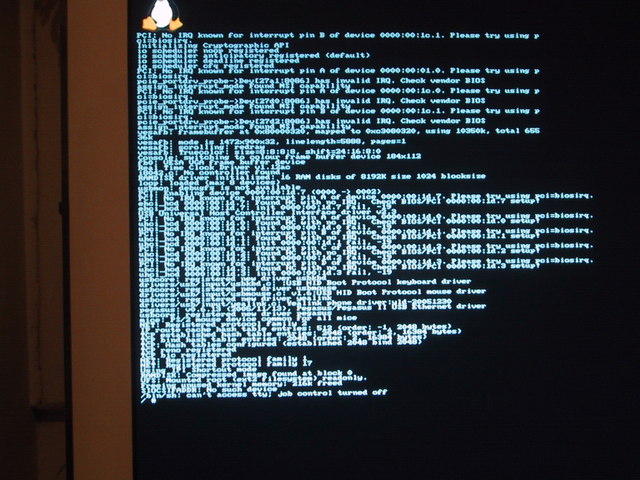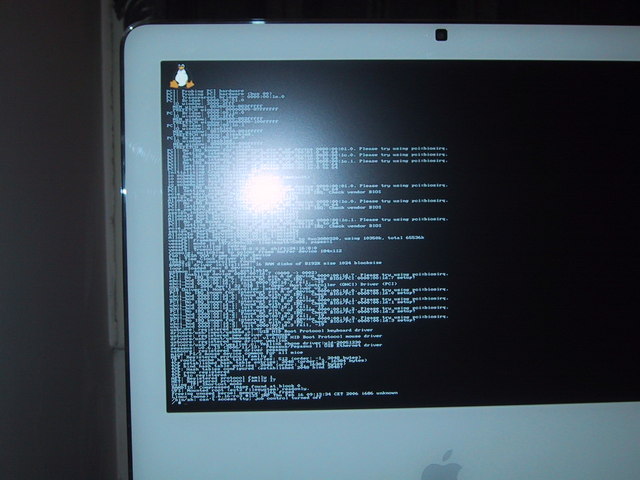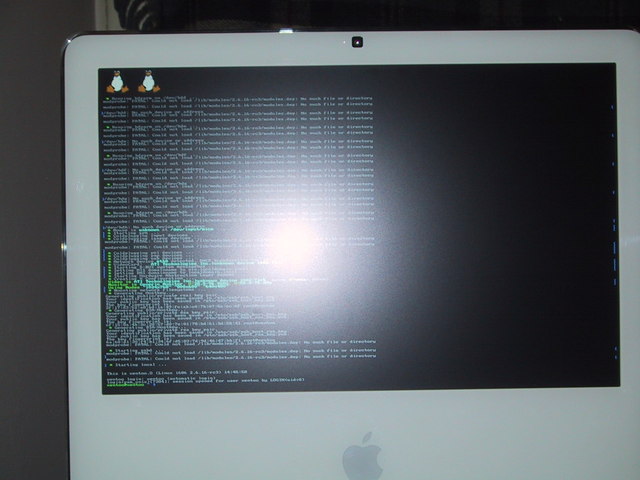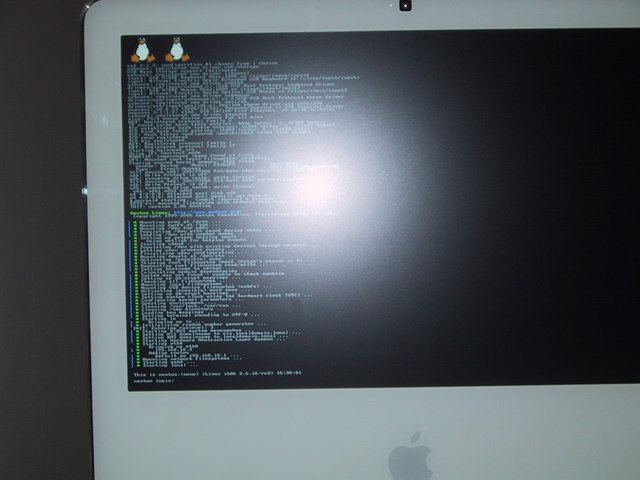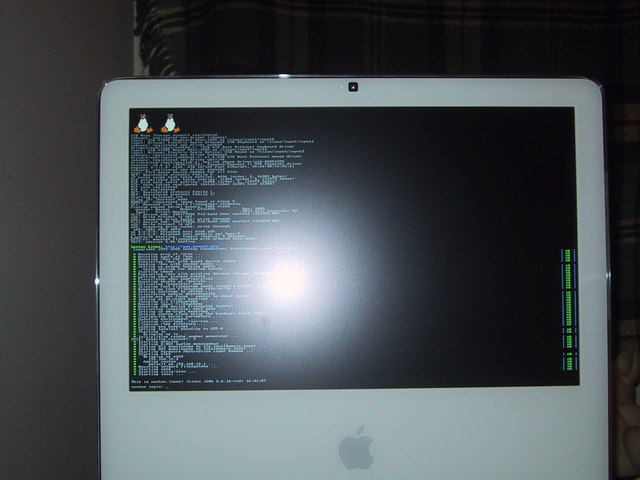 de Hugues le 11 Juin 2005, 23:27
de Hugues le 11 Juin 2005, 23:27
Pour faire contraste un article très sévère du MacObserver non pas envers Apple mais sur le manque d'esprit critique de la presse Mac et de certains utilisateurs intégristes d'Apple. Néanmoins les arguments valent la lecture:
The Devil's Advocate - Mac Punditry: Deranged and Dumb on any Processor
by John Kheit - June 10th, 2005
I wonder if the Atlantic ocean has as vast a collection of spineless jellyfish as seemingly comprises significant portions of the Macintosh user base and its ass-kissing punditry. With far too few exceptions, this is a group that just days ago was smugly debunking, dismantling, and railing against the notion of Intel processors in their Macs, only now to squirm and slither out explanations that provide justifications to the contrary.
They were all laying vitriol to those that dared speak and/or suggest notions contrary to the edicts laid out by their cult leader, Steve Jobs. The Megahertz Myth Mantra chanted by Mac users with regard to Intel chips was enough to annoy even the most dedicated monks. And like good little lemmings, like good 1984 citizens marching in goose-step, the entire lot has done an about face, justifying this move as the "one true way."
Only in the Mac community can the justifications for and against a given position flip-flop overnight with such fervor.
This about-face whiplash can be evinced by the number of half-baked articles that have been written in short order purporting that "if you buy a PPC based Mac today, the fact that Intel machines are coming around the corner should not concern you."
I can understand the loyal fanboy base frothing at the mouth with that kind of stupidity, but there is no excuse for the pundits to be drinking from the same trough of Kool-Aid. The entire lot of BOZOs reminds me of another self-justifying group of Americans that will approve anything their party does, no matter what (apparently its leadership believes it's reasonable to frame all discourse as us versus the-rest-of-the-world; the rest of the world now including all dissenting Americans); but I digress.
Anyway, to quote a far greater Steve authority, "Well excuuuuuuuse me" if some choose to think differently on the topic. As such, let me remind you folks of some reasons to actually hold off on purchases of PPC based Macs; here are eight-is-enough reasons:
1. Software vendors will abandon support for PPC machines as soon as it makes business sense to do so.
For those that don't remember, let me refresh your recollection. During the NeXTSTEP days (when NeXTSTEP transitioned from Motorola to Intel), and during the Apple 68k to PPC transition there were companies that abandoned making software for the older architecture within a couple of years. True, most software vendors supported dual platforms for a very long time, but others did not because it didn't make financial sense for them to do so. Several game vendors have already expressed glee at the thought of moving to Intel and that they basically cannot wait to dump development for PPC machines. The following was reported to xlr8yourmac.com:
"Game devs seem optimistic. They see porting Windows/x86 to Mac/x86 as much easier. They look forward to the day they don't have to support PPC. ... For the next 3-5 years, their job will be harder since they have to port to two processor architectures and most bugs *are* endian related and that they will have a hard time making the PPC versions run as well as the x86 versions." (emphasis added)
How much do you want to bet a bunch of those developers drop support for PPC Macs far sooner than the aforementioned "3-5 year" period and claim that the games demand the "performance" of the faster Intel machines. We already saw that when Doom 3 was released for the Mac. It supported only the very fastest Macs while leaving many other current and/or new Macs out in the lurch.
2. Software vendors will charge you money for Intel (or PPC) versions of software when it makes business sense to do so.
For the NeXT Motorola 68k to Intel transition, for the Apple Motorola 68k to PPC transition, and for the OS 9 to OS X transition, there were software vendors that charged to upgrade the software for the new platform. Some charged users even when their "upgrade" was the exact same version of the program with no new features. And it makes sense for them to do so. It takes time, money and effort to generate the new software, test it, package it, etc. To most of vendors' credit, most transitional upgrades were free.
3. Apple has shown it drops support for old products regularly because it makes business sense to do so.
Listing the litany of technologies dropped by Apple would result in a large tomb, so I won't go into detail here.
But witness the latest security patch. Did anyone notice no Jaguar (aka OS X 10.2) version of the security patch was released. Why? Because Apple wants you to upgrade to new software. And to motivate you to upgrade, it will use both a carrot and a stick. The stick is that they will drop support for older products as there are diminishing returns resulting from such maintenance expenses. To Apple's credit, I believe it provides really nice upgrades as "carrots" to entice users. For the record, Mac OS X 10.2 was supplanted by 10.3 on October 23, 2003. That means, with regard to timely security support, it has become product-non-grata in less than 2 years. Considering that Steve Jobs mentioned that the entire Intel transition would be complete in two years, that should make at least some people stop and mull things over. Which brings me to the next point.
4. Macs tended to have a far longer life-span than the average PC.
A lot of Mac users have come to expect that their computer will not only last them far longer than 2 years, but that it will stay current and relevant for more than 2 years. There is constant Mac user jabbering and justification regarding the Mac's total cost of ownership and how much longer Macs stay relevant when compared to their PC counterparts; I bet some of it is even set to iambic pentameter. As such, there is a chance if you plunk down around $3 grand for a dual G5 Power Mac today, you'll have a machine that is relevant for far less time than one usually expects in the Mac world. I'll explain this a bit more in point 6, below, but first let's explore another related point.
5. The new Intel machines promise to be much faster than current machines.
Already there are reports that software that is natively compiled to run on Intel based Macs runs faster than on PPC machines. Xlr8yourmac provides an account of a mere single processor Pentium 4 running at 3.6GHz outperforming a dual processor G5 running at 2.7GHz:
"First, the thing is fast. Native apps readily beat a single 2.7 G5, and sometimes beat duals. Really...They are using a Pentium 4 660. This is a 3.6 GHz chip. It supports 64 bit extensions, but Apple does not support that *yet*. The 660 is a single core processor. However, the engineers said that this chip would not be used in a shipping product and that we need to look at Intel's roadmap for that time to see what Apple will ship."
And this is with an early build of OS X on Intel that reportedly is un-optimized. If we can expect orders of magnitude increases in performance as the above seems to suggest, then those that wish to make sizable investments in hardware might do well to hold off for a year or so, if they can. After all, it's reported that Steve Jobs' demo machine sported four such Pentium 4 processors. With greater optimization, faster chips, and more cores, we might expect to buy more of a power increase with the next Intel Mac iteration than we have with the past few PPC iterations combined.
6. People do not buy computers only for how it will serve them today, but for how capable it will be in serving them for their desired term of use.
That is reality. Sure, if you absolutely need a new computer today, because your current computer broke or it's simply not cutting it, then you have little choice but to buy a new machine. And true enough, whatever you buy today will likely serve you well for the next two years. That being said, for many Mac buyers, the expense of a Mac makes it a longer term purchase. Many Mac users expect an ownership term of prime use for more than 2 years. I would bet that most Mac users expect prime use from a Mac to last at least for 3 years, and I would also bet it's common for many Mac users to expect secondary use to extend to the 4th and 5th year. By prime use, I mean Mac users expect a new machine purchased today will be supported and targeted as a 1st class citizen by software developers and they will likely use such a machine as their primary machine. By secondary use I mean that the machines are still expected to be supported by software developers (albeit at the fringes), and the machines may still be used as a primary computer, or perhaps more likely, they will be relegated to secondary uses (i.e., passed on to other less demanding users or used as a support computer).
7. Potentially no Classic support.
I'm sick of all the faux-techno-l33t snobbery of nerdy whiners decreeing how "I don't even use classic apps anymore." Well bully for them. I do not happen to use Classic, but I know many that do, and I have enough sense to know that I'm not in a demographic representative of the entire user base. There are plenty of people that do rely on Classic--for them it's crucial. Many of those individuals work in publishing. It is important that Classic work, and someone should start a petition to make sure Apple realizes its importance. As such, VP Phil Schiller's (incidentally, has there ever been a more apt last name for someone working in marketing?) statements of Classic support not being a high priority could easily alienate those core publishing users (all of which buttresses my 3rd point, above).
It's amazing that someone in marketing would be so insensitive to one of the company's core user bases. With that kind of attitude, I would not be surprised if significant portions of the publishing industry say "enough" and just jump platforms moving to Windows.
8. Dual booting.
The prospect of buying a Mac that can boot into both OS X and Windows may prove invaluable to many. For users to whom such functionality would be useful, well, they would be crazy to buy a Mac now when new Macs might allow them to boot or otherwise emulate Windows at native speeds. For example, some business might consider buying Macs for its art department and Windows boxes for accounting, but Intel based Macs may allow it to standardize on a single machine. Heck, it might even allow it to save money by buying only a single machine for employees that need access to both platforms.
It's like the entire collection of supposed Mac experts put their collective heads in the sand (or in some other dark orifice) and have decided to sing Pollyanna-like songs rather than thoughtfully looking at the situation. This migration has costly consequences for both consumers and business users depending on the decisions made.
That's not to say that I believe that no one should buy a Mac today. I think for a sizable number of users, the release of new Intel based Macs next year will not change their calculus or affect their purchasing plans. For others, a cost-benefit-analysis might show it to be a good time to spend a little more money to upgrade their current machines and thereby eke out another year's worth of use, which would allow them to wait and see what the new Intel based Macs have to offer.
Regardless, it would not be unreasonable to expect a Mac purchasing lull and I bet Apple has prepared itself for that contingency. Personally, I will not buy a new Mac as the current Apple offerings do not provide sufficient incentive for me to upgrade from my Dual 1.25GHz Power Mac or my 1.33GHz 17" PowerBook G4 (unless Apple releases a dual processor PowerBook), but that's based on my particular set of expectations, budgets, and needs. Others will need to perform their own risk/reward and cost-benefit-analysis.
My point in this rant is that it's realistic to believe that for a substantial number of actual and potential Mac users, holding off on buying a Mac until the new platform is released is the reasonable course of action, and that the Mac press is once again bathing in the deep end of its myopia pool by minimizing that reality.
The Mac editorial punditry's cry of "don't think...buy buy buy" shows the entire lot to be a poorly thought out group of sycophants only too eager to line up and kiss the ass of Steve Jobs with little thought given to just how brown they want their noses, and all the less thought to the needs, budgets and best interests of entire groups of consumers.
Here's a seismic change for the platform and all the collected intelligentsia can do is to tell you to go shopping without identifying any potential costs and/or issues that the platform change presents. Ridiculous. I cannot imagine any other industry where the collective "experts" would react to such a huge and impending change in technology by instructing everyone to blithely march forth making purchases with the general advice being: "don't worry, be happy" and that "this changes nothing." It's as if filling the coffers of the vendor in question is more important than the needs and/or concerns of the consumer.
Then again this is the cult of Macintosh, so it really comes as no surprise.
Hugues


